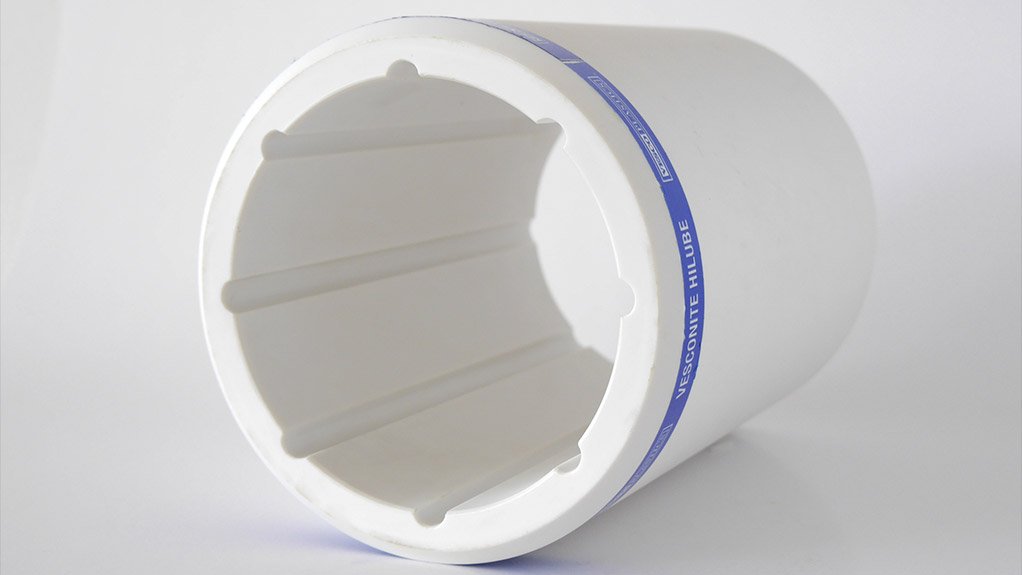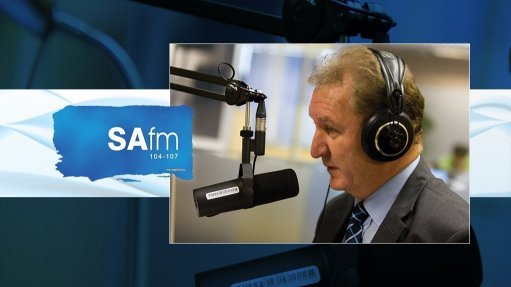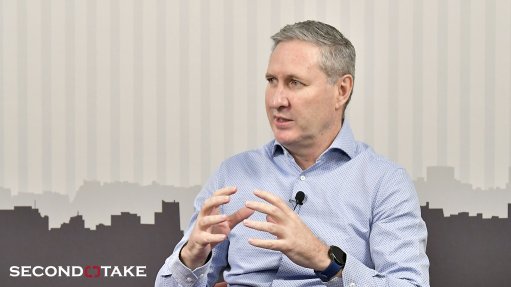Vesconite’s lead-free solutions to reduce lead exposures
This article has been supplied as a media statement and is not written by Creamer Media. It may be available only for a limited time on this website.
Vesconite Bearings hopes to be part of the global programme to reduce lead exposure from drinking water. It produces products resistant to corrosion-combatting chemicals (which are necessary to reduce lead leaching into the water system). It also provides lead-free bearing materials for pumps and water systems.
Fuel and paint were the most important sources of lead exposure in many countries. But, with lead removed or likely to be removed from these sources, drinking water has become an integral source of controllable lead exposure. Global governments are increasingly drawing attention to lead in water systems and setting guidelines and regulations for control.
A staggered, multifaceted approach towards getting rid of lead in water systems is required due to the legacy use of lead in water systems.
For governments, utilities and households, preventing exposure to lead can mean:-
- Using chemical corrosion measures to reduce the level of lead in drinking water;
- Flushing pipework where water has been standing for long periods in a lead pipe;
- Replacing old lead service lines; and
- Ensuring that all new pipes and fittings are lead-free and that the solder is of a lead-free variety.
Chemical-corrosion dosing
For many countries, lead-service-line replacement is prohibitive because of the cost. Such is the case with the UK, for instance, where the cost of replacing lead piping has been estimated at between £8-10 billion.1
Lead service lines and components need to be replaced in the long term, but the short- and medium-term strategy is to reduce the likelihood of lead dissolving in the system by introducing a corrosion inhibitor, most commonly orthophosphate.
Vesconite can play a role in a corrosion-reduction strategy to combat lead exposure. Its bearing products are resistant to most chemicals and will not degrade in water systems. At the same time, Vesconite has the benefit of being lead-free and will not introduce additional lead into the system.
Orthophosphates and Vesconite products work particularly well where organic material is removed from water systems, since orthophosphates may increase bacterial growth on some plastics.
Installation and repair of water systems
Some countries have introduced legislation affecting the installation and repair of water utilities. This ensures that no additional lead is introduced into the water system and that there is a reduction in the quantity of lead in the system.
Such is the case with the US’s Safe Drinking Water Act which prohibits the “use of any pipe, any pipe or plumbing fitting or fixture, any solder, or any flux, after June 1986, in the installation or repair of (i) any public water system; or (ii) any plumbing in a residential or non-residential facility providing water for human consumption, that is not lead-free”.2
For utilities implementing this policy, Vesconite’s Hilube bearing material has NSF61 approval for use in potable water applications.
This certification should provide comfort and assurance to utilities that need to abide by the US’s Environmental Protection Agency’s (EPA’s) final regulation on the “Use of Lead-Free Pipes, Fittings, Fixtures, Solder, and Flux for Drinking Water”. The September 2020 regulation requires that manufacturers and importers of components used in drinking water systems certify their products have met the requirements of the regulation within three years of the final rule publication date.3
Replacement of lead service lines and components
Strategies on whether lead service lines and lead components must be replaced entirely or partially differ between and within countries. For instance, Southern Germany prohibited lead pipes more than 100 years ago, while Northern Germany, which continued to use lead piping into the 1970s, is currently focusing on getting rid of lead service lines.4
There seems to be a worldwide groundswell of interest in replacing lead piping since piping is the main cause of lead contamination in water systems. Other parts of the water system, while they may not be the priority source of lead exposure, are also not being ignored. Solder, fittings (including alloy fittings with high lead content) and service connections, contribute to lead in tap water and remain a concern for the World Health Organization, as indicated in its Guidelines for Drinking-water Quality.
Lead-containing bronze, for instance, has been seen as problematic for the bearings and impellers contained in pumps and water systems. Alloys such as zinc, tin or aluminium have sometimes replaced lead - this replacement will benefit the health of countries that introduce such products but these alloys tend to be adversely affected by chlorine dosing over an extended time.5 However, should lead-free, chlorine resistant, long-lasting Vesconite bearing materials replace these materials, they would lower maintenance time and costs while at the same time reducing lead exposure.
Lead in drinking water
Different countries have set the allowable quantities of lead in drinking water. However, the lower the levels the better. There are no safe levels of lead, say experts. This statement is notably true for children who can experience behaviour and learning problems, lower IQ and hyperactivity, slowed growth, hearing problems, anaemia and, in rare cases, seizures, comas or death with even low levels of lead in the blood.6
Comments
Press Office
Announcements
What's On
Subscribe to improve your user experience...
Option 1 (equivalent of R125 a month):
Receive a weekly copy of Creamer Media's Engineering News & Mining Weekly magazine
(print copy for those in South Africa and e-magazine for those outside of South Africa)
Receive daily email newsletters
Access to full search results
Access archive of magazine back copies
Access to Projects in Progress
Access to ONE Research Report of your choice in PDF format
Option 2 (equivalent of R375 a month):
All benefits from Option 1
PLUS
Access to Creamer Media's Research Channel Africa for ALL Research Reports, in PDF format, on various industrial and mining sectors
including Electricity; Water; Energy Transition; Hydrogen; Roads, Rail and Ports; Coal; Gold; Platinum; Battery Metals; etc.
Already a subscriber?
Forgotten your password?
Receive weekly copy of Creamer Media's Engineering News & Mining Weekly magazine (print copy for those in South Africa and e-magazine for those outside of South Africa)
➕
Recieve daily email newsletters
➕
Access to full search results
➕
Access archive of magazine back copies
➕
Access to Projects in Progress
➕
Access to ONE Research Report of your choice in PDF format
RESEARCH CHANNEL AFRICA
R4500 (equivalent of R375 a month)
SUBSCRIBEAll benefits from Option 1
➕
Access to Creamer Media's Research Channel Africa for ALL Research Reports on various industrial and mining sectors, in PDF format, including on:
Electricity
➕
Water
➕
Energy Transition
➕
Hydrogen
➕
Roads, Rail and Ports
➕
Coal
➕
Gold
➕
Platinum
➕
Battery Metals
➕
etc.
Receive all benefits from Option 1 or Option 2 delivered to numerous people at your company
➕
Multiple User names and Passwords for simultaneous log-ins
➕
Intranet integration access to all in your organisation





















